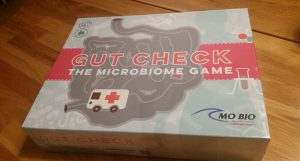This fall, a new diversion emerged for a certain scientific set—those for whom Prevotella melaninogenica rolls easily off the tongue. Appearing as the after-hours entertainment at Lake Arrowhead Microbial Genomics 2016, and other conferences focused on bacteria, is Gut Check, a board game created by David Coil, project scientist in microbial ecology and genomics at University of California, Davis (USA).
Described as a “scientific, strategic and competitive board game”, Gut Check is available for free (to download and print at home) or for purchase. In the game, each person has a player board representing his or her individual gut microbiome. The object is to move through higher and higher states of health, avoiding the state of “zero health” (death).
The player who goes first is the one who has most recently eaten yogurt. From a handful of cards, a player can choose to lay down different microbial species on his/her own board or someone else’s board. Players can choose to target someone at the table with a pathogen (for example, giving a fellow player Yersinia pestis, which causes “the Plague”) or boost their own microbiomes with beneficial species, while event cards—like salad consumption or an airplane trip—increase or decrease a player’s health.
Balancing risk and reward is the major challenge of the game—just as in the real life of the gut microbiome. A player can take antibiotics, but it affects both the pathogens and the beneficial species for the rest of the time they’re in play. And when it comes to the graphics, the game stays classy: no poop emojis appear anywhere.
Gut Check appears to have been created primarily for the amusement of scientists in their free time, and perhaps for the fostering of knowledge among biology students. Those with no links to biology can play—and indeed learn something—but to them the game can have the feel of inside joke after inside joke. But biologist or not, no one walks away from the table without understanding the concept of bacterial species in the gut constantly coming and going, and the idea of travel, diet, and other ‘events’ changing an individual’s gut microbiome with effects on health.
The website of MO BIO Laboratories, the San Diego company that recently published the board game, states, “It is MO BIO’s aim to make scientists’ working life more productive and efficient, in order to give them time to focus on what is critical, not only at work, but in life.” Possibly, Gut Check is included in their definition of a ‘critical’ life activity—that is, in the midst of a daily grind ruled by lab timers and writing deadlines, it’s a way to remember what’s fun about bacteria.
See a video tutorial on Gut Check here.




